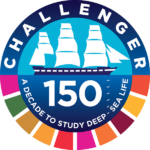IOC Endorses Challenger 150

An outcrop of rock makes a perfect home for many different cold water coral species. Image courtesy of the NERC funded Deep Links Project (University of Plymouth, Oxford University, JNCC, BGS).
The Intergovernmental Oceanographic Commission of UNESCO formally announced today, World Ocean Day, that it would endorse Challenger 150, a new 10 year programme focused on deep-sea science, as an action of the UN Decade of Ocean Science for Sustainable Development.
Challenger 150, is a global cooperative that brings together deep-sea researchers from 25+ nations, to coordinate biological sampling, monitoring, methods and capacity building efforts in deep-sea science. Challenger 150 will generate new geological, physical, biogeochemical, and biological data through a global cooperative of science and innovation, including the application of new technology. These data will be used to understand how changes in the deep sea impact the wider ocean and life on the planet.
The Pacific, Arctic and Atlantic Oceans will be explored within the first three months of the programme, followed by at least 19 other deep-sea research expeditions over the next three years reaching all around the globe. The expeditions will aim to build greater capacity and diversity in the deep-sea scientific community, acknowledging the fact that existing deep-sea research is conducted primarily by developed nations with access to resources and infrastructure.
Challenger 150 co-leads, Drs. Kerry Howell (University of Plymouth, UK) and Ana Hilário (University of Aveiro, Portugal) are eager to begin. “Effective management of the deep sea is a truly global challenge that demands a cooperative approach to science, informed by end-user needs,” said Prof Howell. Dr Hilário continued “Challenger 150 aims to train the next generation of deep-sea biologists and to strengthen deep-sea scientific expertise in nations where opportunities for research has been is limited; such enhanced capacity will allow countries to exercise their full role in international discussions on the use of ocean resources within and outside of their national boundaries.”
Challenger 150 is a grassroots programme, organised through Regional Scientific Research Committees that interact with relevant community stakeholders to ensure field projects remain aligned with regional end-user needs. These Committees will catalyse co-design and co-delivery approaches throughout the Decade.
Key to achieving the programme’s aims are partnerships with REV Ocean and the Schmidt Ocean Institute. Both philanthropic organizations will be supporting Challenger 150 with the development of deep-ocean scientific capacity and knowledge exchange, through oceanographic expeditions and other programs. The goal is to improve long-term deep-sea research skills in nations where they are currently limited and amongst early career scientists.
“Challenger 150 is an exciting programme drawing together researchers from all over the world to collaborate on solving the mysteries of the deep ocean: how much life it harbours, where it is found, how deep-sea ecosystems function and how it contributes to us, humankind,” said Dr Alex Rogers, REV Ocean Director of Science. “I am delighted UNESCO IOC have approved this programme, I have no doubt we will discover many new species and things about the deep sea we never suspected.”
REV Ocean will support Challenger 150 through the Deep-Ocean Training (DOT) expeditions which include 18 days of ship time per year throughout the decade. DOT follows the model of the successful UNESCO-IOC Training Through Research (TTR) program.
“The ocean accounts for over 95% of the Earth’s living space, but less than 5% has been explored. In this Decade of Ocean Science, Challenger 150 is a bold programme that focuses attention on the deep sea, broadening global inclusivity whilst advancing our knowledge about our ocean,” said Dr. Jyotika Virmani, Schmidt Ocean Institute Executive Director. “We now have the technology to really uncover these hidden depths, allowing scientists from all over the world to collaborate on important deep-sea expeditions and to share that data to help inform policy and management decisions”
Working closely with the Deep-Ocean Stewardship Initiative (DOSI), the programme will use new knowledge of the deep to support regional, national, and international decision-making on deep-sea issues including mining, hydrocarbon extraction, fishing, climate mitigation, laying of telecommunications cables and conservation.
Working alongside other Ocean Decade programmes Challenger 150 will contribute to achieving the Ocean Decade objectives.
About the Organisations
General information about the UN Decade
The United Nations General Assembly has declared the decade of 2021-2030 as the United Nations Decade of Ocean Science for Sustainable Development (‘the Ocean Decade‘), aimed to stimulate ocean science and knowledge generation to produce new opportunities and create public awareness on the usefulness of ocean for its sustainable use. The decade proposals all work towards achieving the UN Sustainable Development Goals (SDGs), particularly SDG 14 (‘Life Below Water’), as well as others.
Schmidt Ocean Institute
Schmidt Ocean Institute was established in 2009 by Eric and Wendy Schmidt to advance oceanographic research through the development of innovative technologies, open sharing of information, and broad communication about ocean health. It operates Falkor, the only year-round philanthropic research vessel in the world that is made available to the international science community at no cost. For more information, visit www.schmidtocean.org.
REV Ocean
REV Ocean is a not-for-profit company created with one overarching purpose and ambition – to make our oceans healthy again. Established in Norway in 2017, REV Ocean’s mission is to enable and inspire ocean solutions and combat the negative pressures currently affecting the ocean. The science strategy is focused on dealing with plastic pollution, climate change, and the environmental impacts of unsustainable fishing.
Deep-Ocean Stewardship Initiative
Established in 2013, the Deep-Ocean Stewardship Initiative (DOSI) is a multi-disciplinary network of >2,000 deep-sea scientists and other stakeholders from 96 countries. DOSI facilitates knowledge transfer between policy makers, scientists and the public to ensure robust deep-ocean governance to maintain global ocean ecological functioning for future generations, paying attention to cross-cutting legislative issues.


